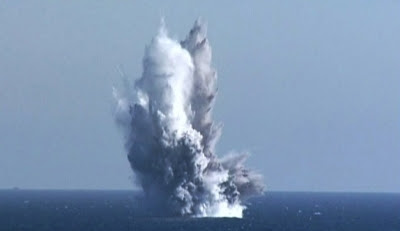North Korea tested a new underwater nuclear weapon earlier this week capable of spawning a “radioactive tsunami”, Pyongyang’s state media said on Friday.
Separately, the North also conducted a cruise missile drill using missiles “tipped with a test warhead simulating a nuclear warhead” as it slammed the combined military exercises between South Korea and the US as an “actual drill” for “occupying” Pyongyang, Pyongyang’s official Korean Central News Agency (KCNA) said in a report.
Advertisement
The Central Military Commission of the North’s ruling Worker’s Party (WPK) commanded the drills from March 21 to 23 “in order to alert the enemy to an actual nuclear crisis and verify the reliability of the nuclear force for self-defence”, Yonhap News Agency quoted the KCNA as saying.
The “underwater nuclear attack drone” was deployed off the coast of Riwon county, South Hamgyong province, on Tuesday and reached the target point in the waters off Hongwon Bay set as a mock enemy port with its test warhead detonating underwater on Thursday afternoon, it said.
The drone cruised “along an oval and pattern-8 course at an underwater depth of 80 to 150 meters in the East Sea of Korea for 59 hours and 12 minutes”.
The North claimed that the drones, designed to “stealthily infiltrate into operational waters and make a super-scale radioactive tsunami” to destroy naval striker groups and major ports of its enemies, can be deployed “at any coast and port or towed by a surface ship for operation”.
North Korea began developing such underground nuclear weapons in 2012 to “outpace the military and technical superiority of the imperialist aggressor forces”, the KCNA said.
The “secret weapon” was named “unmanned underwater nuclear attack craft ‘Haeil'” at the eighth congress of the WPK in 2021 and has undergone more than 50 shakedowns in the past two years, it added.
The North also test-fired strategic cruise missiles “tipped with a test warhead simulating a nuclear warhead”, according to the KCNA.
It said two “Hwasal-1” strategic cruise missiles and two “Hwasal-2” strategic cruise missiles, launched in South Hamgyong province, accurately hit the target set in the East Sea.
The missiles flew on their “programmed 1,500km- and 1,800km-long oval and pattern-8 orbits for 7,557 to 7,567 seconds and 9,118 to 9,129 seconds respectively.
South Korea’s military earlier said it detected multiple cruise missile launches from the North’s eastern city of Hamhung on Wednesday morning.











